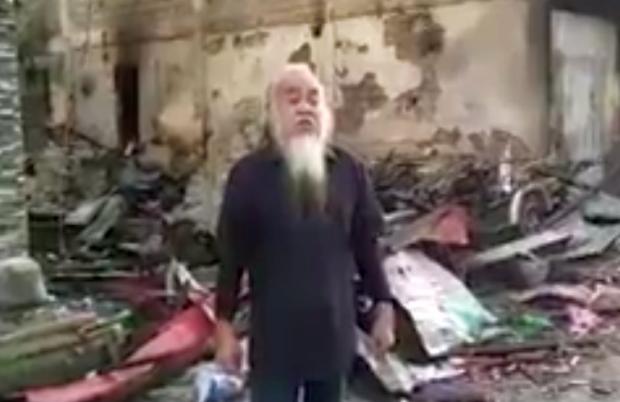
Fr. Teresito Suganob makes an appeal to President Rodrigo Duterte to stop military operations in Marawi. (Photo from a video circulating on Facebook)
ZAMBOANGA CITY – Fr. Teresito Suganob, the vicar general of Marawi who was taken hostage by Islamic State-inspired terrorists, is alive.
According to hostages who recently escaped from their captors, the priest had been forced to gather the gunpowder from firecrackers, which the terrorists would use to make bombs.
“Before we escaped, we saw him being ordered by the Maute to scrape off gunpowder from firecrackers,” according to Rumar Marjalino, who escaped from the militants before midnight of Aug. 3.
“These explosives will be tied to our bodies,” he said. “If worse comes to worst, they will use our bodies to blow up troops.”
Rumar Marjalino, his brother Rowel, Jimmy Esperat – all from Zamboanga – and Delfin Lapas of Iligan City escaped from their captors on August 3. They swam about a kilometer of Lake Lanao toward a Philippine Navy boat.
Marjalino said 46 civilians, including Suganob, were still being held by the militants. Of the hostaged civilians, 20 are women, mostly teachers, 13 children as young as two-years old, and the rest are male adults.
He said the priest had already accepted what his fate would be.
“He told us that he’ll accept it if he’ll be hit by jet fighters’ bombs,” Marjalino said.
He said they had tried to convince Suganob to join them in their escape, but the priest opted to stay as he did not want to leave behind the other captives.
Forced to use guns
The Marjalino brothers, Esperat, and Lapas are construction workers who were in Marawi when fighting broke out on May 23. They hid in a house in Barangay Raya Madaya, but seven days later, the militants found them.
“They took everything – our phones, our belongings, everything,” Rumar Marjalino said.
For him, there were “good Mautes and bad Mautes.”
He considered as “good Mautes” those who found them because they were spared from execution. Instead, they were “used as shields.”
“We were forced to use guns,” Esperat said. “Those who refused were gunned down. To survive, we followed them – volunteered to cook, volunteered as food runners. That was how we survived.”
Marjalino said they were also tasked to look for or deliver food in locations where the militants were positioned. He said they did not think of escaping during food hunting and delivery because a bomb, which can be remotely detonated, were strapped to their bodies.
During these errands, they found dead bodies.
“We took their phones, if there’s any, and we used the emergency lines calling my wife [Mary Joy],” Marjalino said.
The militants also ordered them to gather cellular phones to be used for improvised explosive devices.
“The longest call [to my wife] was about a minute as we were running in the middle of gunfire,” Marjalino said.
But he said he did not tell his wife that they had been taken as hostages. He said they feared that if the military would learn about their location, they, along with the militants, would be bombed.
Reunited with families
“On the night of our escape, one good Maute turned a blind eye. Maybe he thought we would not make it,” Marjalino said. “It was God who played everything. That night, not a single sniper fired his shot. Not a single sound was heard.”
As they were escaping, he called his wife Mary Joy, who informed someone she knew in the Navy.
“This man gave the signal,” Marjalino said. “We hurried until we reached the lake and we were told to swim 1,000 meters. Despite the heavy waves, we stayed together. God was there. God is good.”
The Marjalinos and Esperat were reunited with their families on Sunday morning.
Rear Adm. Rene Medina, commander of Naval Forces Western Mindanao, officially turned them over to their wives.
The reunited families then had a brief stop at the La Naval Chapel for prayers, then to Camp Don Basilio Navarro Hospital for a medical examination.
“Then we will bring them to their homes so they can have a real rest,” Medina said.
Grateful to the Navy
Speaking for the other wives, Mary Joy Marjalino said they “owe their husbands’ lives to the Philippine Navy.”
“They never left us,” she said. “They never doubted our words, and they brought our husbands back to us alive.”
She said two people helped her, but she only know them as Bon-Bon and Maki.
It turned out that Bon-Bon is Seaman 2nd Class Bernard Bonnie Vicente.
Maki remains unidentified.
Rumar Marjalino was also grateful to Army soldier Rico Matos.
“He made us feel better after our ordeal,” he said. /atm